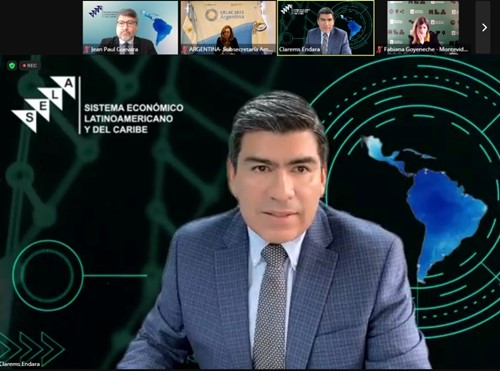
The Latin American and Caribbean Economic System (SELA) and the Community of Latin American and Caribbean States (CELAC) held the Virtual Seminar “Towards a comprehensive migration policy in the region,” as part of the joint agenda developed by both organisations for the convergence of issues of regional interest.
“Public policies that promote the socio-economic integration and social cohesion of migrants are necessary. Different policies that can be implemented by States can play an important role in turning migration into an opportunity for development,” Ambassador Clarems Endara, Permanent Secretary of SELA, said during the opening of the Virtual Seminar. He added that “it is time to promote the analysis of migration as a positive factor and understand the potential of migration for the socio-economic development of host countries and also for the countries of origin.”
He also called for working for the inclusion of migrants and promoting safe, orderly, and regulated migration to reduce the inequality gap between countries. “If we manage to implement mechanisms to ensure that human mobility is safe and inclusive, and that public policies place the human rights of migrants at the centre, we will be able to turn migration into a factor for sustainable development,” the Permanent Secretary of SELA pointed out.
For her part, the CELAC representative, Argentina’s Undersecretary for Latin America and the Caribbean, Marina Mantecón Fumadó, explained that migration is part of a response to the global socio-economic context, “which pushes populations to move from one country to another, making cooperation on migration issues increasingly necessary.”
“Migration is a positive historical process that contributes to the socio-cultural and economic spheres and must be approached from an integral perspective. The challenge is to be able to find articulated formulas between each of our countries based on our own circumstances,” Marina Mantecón Fumadó stressed.
The virtual seminar was moderated by SELA Consultant Jean Paul Guevara, with the participation of Ana Laura Cachaza, Director-General of Consular Affairs of the Argentinean Foreign Ministry; Andrés Pérez Esquivel, Director of International Affairs of the National Directorate of Migration of Argentina; Teresa Heessel Pimentel Vázquez, Migration Policy Coordinator of the Migration Policy, Registration and Identity of Persons Unit of Mexico; Ezequiel Texidó, Regional Policy and Liaison Officer of the International Organisation for Migration (IOM); Jorge Martínez, Researcher at the Latin American and Caribbean Demographic Centre (CELADE)-Population Division of the Economic Commission for Latin America and the Caribbean (ECLAC); Natalia Álvarez, Coordinator of the Migration Unit of the International Organisation for Migration (IOM-Central America); Abelardo Morales of FLACSO Costa Rica; Alejandro Canales, Academician at the Colegio de México; Julieta Bengochea, Professor and Researcher, Population Programme, Faculty of Social Sciences, University of the Republic of Uruguay; Fabiana Goyeneche, Director of the International Relations and Cooperation Division, Government of Montevideo and Andrés Rosales, President of the Global MX Network – Uruguay Chapter.
